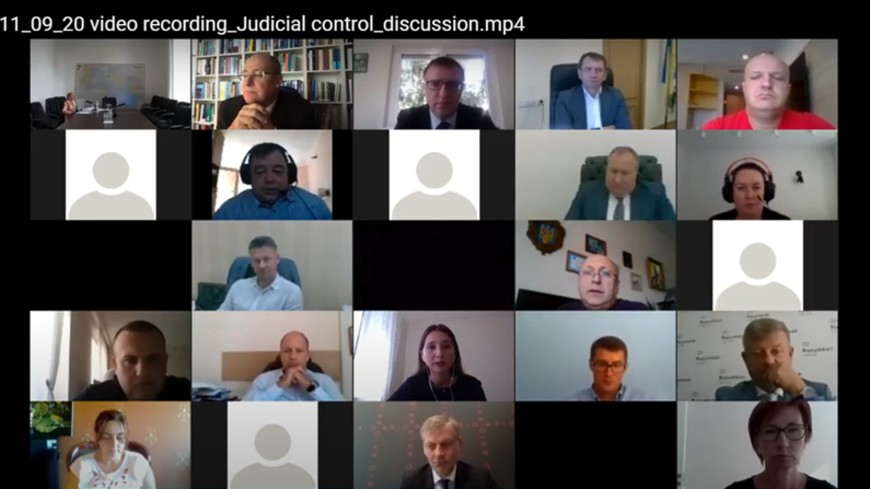On 11 September 2020, the Council of Europe Project “Further support for the execution by Ukraine of judgments in respect of Article 6 of the European Court on Human Rights” (the Project) and the Supreme Court jointly organised and held the expert discussion on the introduction of effective judicial control over the execution of national judgments in the context of the execution by Ukraine of the European Court of Human Rights (ECtHR) judgements in the cases of Yuriy Nikolayevich Ivanov v. Ukraine and Burmych and Others v. Ukraine.
The judges and representatives of the Supreme Court, the State Judicial Administration of Ukraine and the National School of Judges of Ukraine, the judges of the Lviv district administrative court, representatives of the Ministry of Justice of Ukraine, the Ministry of Finance of Ukraine, the State Treasury Service of Ukraine, the Ministry of Social Policy of Ukraine and the Pension Fund of Ukraine, representatives of the Verkhovna Rada of Ukraine, representatives of civil society and international organisations and representatives and experts of the Council of Europe participated in the event.
The objective of the event was to present and discuss the expert analysis of the mechanisms of judicial control to be exercised in due regard with the practices and standards of the Council of Europe to facilitate the enforcement of national judgments in Ukraine; exchange opinions on the issues related to judicial practices in the context of the application of existing judicial control tools; discuss conclusions and recommendations as to the introduction of effective mechanisms of judicial control in Ukraine to execute ECtHR judgments in the Ivanov/Burmych group of cases. Another objective of the event was to propose possible avenues of enhancing the national legislation and judicial practices regulating mechanisms of judicial control.
Pavlo Pushkar, Head of Division of the Department for the Execution of Judgments of the European Court of Human Rights of the Directorate-General for Human Rights and the Rule of Law of the Council of Europe, introduced in his speech three issues for the discussion: the legal content of the institution of judicial control, provided for in the Constitution; the ideology of the “control” and the “participation of a court in the execution of its judgments”; and the definition of the role of the judiciary in the execution of judgments; the requirements of the ECtHR case-law regarding the remedy and the “judicial control over execution”. The speaker also drew the participants’ attention to the present situation in Ukraine with regard to the execution of judgments issued against the state. In particular, according to Pavlo Pushkar, the draft laws which are currently before the Verkhovna Rada do not fully reflect two aspects of the ECtHR requirements, that is, systematic enforcement of decisions issued against the state and the establishment of remedies. In conclusion, Pavlo Pushkar pointed out the need for the enlargement of the institution of judicial control from the perspective of the ideology and principles of the ECtHR, Committee of Ministers and the Council of Europe standards. “It is furthermore necessary to change the ideology of judicial control and define the limits for the engagement of the judiciary in the execution of its decisions”, said Mr Pushkar.
Oleh Tkachuk, the judge of the Grand Chamber of the Supreme Court, presenting his report “The judiciary’s vision of the problems related to the application of certain judicial control tools and proposals to ensure proper enforcement of judicial decisions”, stressed that a comprehensive approach was needed to address problems related to the enforcement of judicial decisions. The judge of the Grand Chamber of the Supreme Court proposed that structural changes be introduced to the organisation of performance of the enforcement service and the authorities strengthen control over the enforcement of judicial decisions; that the procedural law be enhanced with regard to judicial control over the enforcement; that the institution of private enforcement agents be strengthened, their number increased, and their powers extended.
Jos Uitdehaag, the international expert of the Project, presented his report on the best practices and standards of the Council of Europe pertaining to the mechanisms of judicial control over the execution of judgments, emphasising that striking a balance between preventive (professional standards etc.) control measures and reactive tools (remedies) applied by the judiciary, had a more positive outcome than a focus on judicial control only.
In general, the participants of the event has come to the conclusion that the following measures are necessary to be applied: holding additional discussions among the Supreme Court judges and methodological work with the judges of first instance courts to produce new deliverables with regard to judicial control over the enforcement of judgments; additional analysis and deliverables to be provided by the Scientific and Consultative Council under the Supreme Court with regard to the enhancement of legal regulation of control over the enforcement of judgments; practical implementation of some aspects of judicial control. The participants also agreed on possibility to produce specific ideas concerning the regulation of judicial control on the basis of the Constitution and possible amendments to the procedural legislation and in accordance with the practice of national courts as required by the Committee of Ministers of the Council of Europe.
The Project of the Council of Europe “Further support for the execution by Ukraine of judgments in respect of Article 6 of the European Convention on Human Rights” is funded by the Human Rights Trust Fund and is being implemented in Ukraine by the Justice and Legal Co-operation Department of the Council of Europe.
WEB LINKS TO THE EVENT
https://supreme.court.gov.ua/supreme/pres-centr/news/992603/
https://dsa.court.gov.ua/dsa/pres-centr/news/991246/






